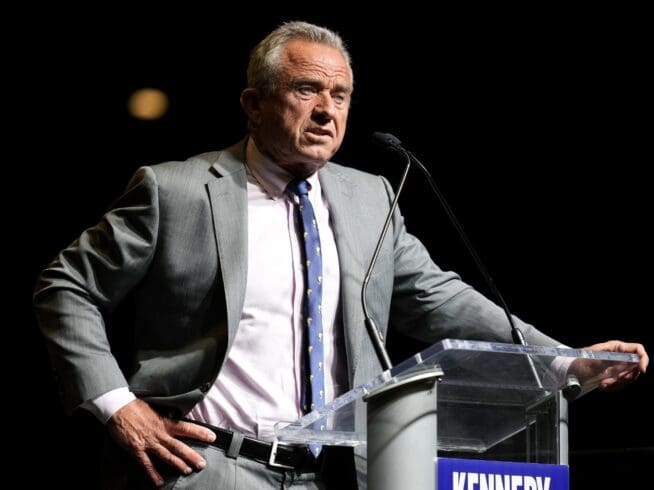Michigan is raising the minimum wage to $10.33 in 2024
Workers could see greater wage increases in the future due to an ongoing lawsuit and a ballot petition drive.

Michigan residents making the minimum wage will see a pay increase from $10.10 to $10.33 an hour starting January 1. Base pay for 16- and 17-year-olds will also increase from $8.59 to $8.78 per hour, while tipped workers will be paid $3.93 per hour, up from $3.84.
The wage increases stem from legislation passed by the Republican-led Legislature, but an ongoing court case and ballot petition drive could give workers a greater boost in wages.
In 2018, Michigan lawmakers passed the Improved Workforce Opportunity Act, which created an annual increase of the state’s minimum wage until it reaches $12.05 in 2030. It started out as a citizen-led petition drive, but the Republican-led Legislature passed and substantially changed the proposed law using a legislative procedure.
Under Michigan law, the “adopt and amend” procedure allows the Legislature to either adopt a law or pass the measure onto voters as a ballot proposal. In this case, the Republican majority decided to adopt the proposal, but it completely changed the proposal’s language and removed key provisions.
The initial petition would have increased the state minimum wage to $12.00 by 2022 and calculated the wage annually based on inflation in the following years. It also would have gradually phased out the “subminimum wage” – or a lower pay for tipped workers, minors and people with disabilities – so that it would match the regular minimum wage. In addition to slowing the minimum wage increase, the Republican majority completely nixed the elimination of the subminimum wage.
Advocacy groups that helped circulate the petition sued the state over the substantial changes the Legislature made to the law. In 2022, the Michigan Court of Claims ruled the Legislature’s actions contradicted the will of the voters, but the Michigan Court of Appeals reversed the lower court’s decision this year. The ruling was appealed, and the state Supreme Court agreed in June to hear the case.
Michigan ranks 27th among the thirty states and Washington, D.C. with a minimum wage above the federal standard of $7.25 as of October. For reference, employees earn the highest minimum wage in Washington, D.C. at $17 an hour.
Meanwhile, the Raise the Wage Michigan ballot committee is having a go at another petition drive similar to the one in 2018.
This time, the minimum wage would increase by $1 increments every year until reaching $15 in 2027. After 2027, increases would be adjusted based on the rate of inflation. Subminimum wage would be phased out to match the regular minimum wage by 2028.
The petitioner’s efforts hit a snag in October when the two Republicans and two Democrats who serve on the Michigan Board of State Canvassers deadlocked on its certification.
The board approved Raise the Wage Michigan’s petition summary language in January 2022 that changed the state’s definition of employer from someone with two or more employees to someone with one or more employees. However the group didn’t remove the “2”, so the final petition defined an employer as someone with “21” or more employees; the board hadn’t approved that change. Under the new definition, about 90% of Michigan businesses would be exempt from paying minimum wage.
The petitioners used the unapproved “21 or more employees” definition to gain signatures — a change Raise the Wage Michigan attorney Mark Brewer told the board was intentional.
Andrea Hansen, an attorney for an opposition group called Michigan Opportunity, argued the petition’s language change was misleading to signers and gave the board a valid reason not to certify it.
“Mistakes and proofreading errors in these legal documents matter and they have consequences, sometimes really big ones,” Hansen said. “And this is a big mistake that unfortunately has a big consequence.”
Brewer insisted the board’s only responsibility was to certify that the petition had enough signatures to proceed.
“The courts have been clear that even if there’s a defect in the petition, the remedy is not to not place it on the ballot,” Brewer said. “The remedy is to place it on the ballot, and leave it to the courts to resolve that issue if the proposal is adopted.”
According to the Detroit News, Saru Jayaraman, president of One Fair Wage, the organization that created the Raise the Wage Michigan ballot committee, called the canvassers’ decision not to certify the petition in October a “ridiculously outrageous, partisan, unethical act.”
Raise the Wage Michigan has since filed a complaint with the Michigan Court of Appeals.
If they’re successful, Jayaraman told the Detroit News, she hopes the Legislature, with Democrats now in the majority, will adopt the measure rather than put it on the ballot in 2024.
“It’s in the interest of this Legislature and this governor to adopt it and claim credit for something that is so universally popular,” Jayaraman said.




